- Home
- Chinua Achebe
There Was a Country: A Personal History of Biafra
There Was a Country: A Personal History of Biafra Read online
ALSO BY CHINUA ACHEBE
The Education of a British-Protected Child
Collected Poems
Anthills of the Savannah
The Sacrificial Egg and Other Stories
Things Fall Apart
No Longer at Ease
Chike and the River
A Man of the People
Arrow of God
Girls at War and Other Stories
Beware Soul Brother
Morning Yet on Creation Day
The Trouble with Nigeria
The Flute
The Drum
Home and Exile
Hopes and Impediments
How the Leopard Got His Claws
(with John Iroaganachi)
Winds of Change: Modern Short Stories from Black Africa
(coeditor)
African Short Stories
(editor, with C. L. Innes)
Another Africa
(with Robert Lyons)
THERE WAS A COUNTRY
A PERSONAL HISTORY OF BIAFRA
Chinua Achebe
THE PENGUIN PRESS
New York
2012
THE PENGUIN PRESS
Published by the Penguin Group
Penguin Group (USA) Inc., 375 Hudson Street, New York, New York 10014, U.S.A. • Penguin Group (Canada), 90 Eglinton Avenue East, Suite 700, Toronto, Ontario, Canada M4P 2Y3 (a division of Pearson Penguin Canada Inc.) • Penguin Books Ltd, 80 Strand, London WC2R 0RL, England • Penguin Ireland, 25 St. Stephen’s Green, Dublin 2, Ireland (a division of Penguin Books Ltd) • Penguin Group Australia, 707 Collins Street, Melbourne, Victoria 3008, Australia (a division of Pearson Australia Group Pty Ltd) • Penguin Books India Pvt Ltd, 11 Community Centre, Panchsheel Park, New Delhi – 110 017, India • Penguin Group (NZ), 67 Apollo Drive, Rosedale, Auckland 0632, New Zealand (a division of Pearson New Zealand Ltd) • Penguin Books, Rosebank Office Park, 181 Jan Smuts Avenue, Parktown North 2193, South Africa • Penguin China, B7 Jaiming Center, 27 East Third Ring Road North, Chaoyang District, Beijing 100020, China
Penguin Books Ltd, Registered Offices:
80 Strand, London WC2R 0RL, England
First published in 2012 by The Penguin Press,
a member of Penguin Group (USA) Inc.
Copyright © Chinua Achebe, 2012
All rights reserved
“1966,” “Benin Road,” “Penalty of Godhead,” “Generation Gap,” “Biafra, 1969,” “A Mother in a Refugee Camp,” “The First Shot,” “Air Raid,” “Mango Seedling,” “We Laughed at Him,” “Vultures,” and “After a War” from Collected Poems by Chinua Achebe. Copyright © 1971, 1973, 2004 by Chinua Achebe. Used by permission of Anchor Books, a division of Random House, Inc.
LIBRARY OF CONGRESS CATALOGING IN PUBLICATION DATA
Achebe, Chinua.
There was a country : a personal history of Biafra / Chinua Achebe.
p. cm.
Includes bibliographical references and index.
ISBN 978-1-101-59598-5
1. Achebe, Chinua. 2. Authors, Nigerian—20th century—Biography. 3. Nigeria—History—Civil War, 1967–1970—Personal narratives. I. Title.
PR9387.9.A3Z46 2012
823'.914—dc23
[B]
2012005603
No part of this book may be reproduced, scanned, or distributed in any printed or electronic form without permission. Please do not participate in or encourage piracy of copyrighted materials in violation of the author’s rights. Purchase only authorized editions.
Penguin is committed to publishing works of quality and integrity. In that spirit, we are proud to offer this book to our readers; however, the story, the experiences, and the words are the author’s alone.
CONTENTS
Also by Chinua Achebe
Title Page
Copyright
Maps
Introduction
PART 1
Pioneers of a New Frontier
The Magical Years
A Primary Exposure
Leaving Home
The Formative Years at Umuahia and Ibadan
THE UMUAHIA EXPERIENCE
THE IBADAN EXPERIENCE
Meeting Christie and Her Family
Discovering Things Fall Apart
A Lucky Generation
The March to Independence
The Cradle of Nigerian Nationalism
Post-Independence Nigeria
The Decline
The Role of the Writer in Africa
1966 (poem)
January 15, 1966, Coup
The Dark Days
Benin Road (poem)
A History of Ethnic Tension and Resentment
The Army
Countercoup and Assassination
The Pogroms
Penalty of Godhead (poem)
The Aburi Accord
Generation Gap (poem)
The Nightmare Begins
PART 2
The Nigeria-Biafra War
THE BIAFRAN POSITION
THE NIGERIAN ARGUMENT
THE ROLE OF THE ORGANIZATION OF AFRICAN UNITY
The Triangle Game: The UK, France, and the United States
The Writers and Intellectuals
The War and the Nigerian Intellectual
The Life and Work of Christopher Okigbo
The Major Nigerian Actors in the Conflict: Ojukwu and Gowon
THE ARISTOCRAT
THE GENTLEMAN GENERAL
The First Shot (poem)
The Biafran Invasion of the Mid-West
Gowon Regroups
The Asaba Massacre
Biafran Repercussions
Blood, Blood, Everywhere
The Calabar Massacre
Biafra, 1969 (poem)
The Republic of Biafra
THE INTELLECTUAL FOUNDATION OF A NEW NATION
The Biafran State
THE BIAFRAN FLAG
THE BIAFRAN NATIONAL ANTHEM
THE MILITARY
OGBUNIGWE
BIAFRAN TANKS
A TIGER JOINS THE ARMY
FREEDOM FIGHTERS
Traveling on Behalf of Biafra
Refugee Mother and Child (A Mother in a Refugee Camp) (poem)
Life in Biafra
The Abagana Ambush
Air Raid (poem)
The Citadel Press
The Ifeajuna Manuscript
Staying Alive
Death of the Poet: “Daddy, Don’t Let Him Die!”
Mango Seedling (poem)
Refugees
We Laughed at Him (poem)
The Media War
Narrow Escapes
Vultures (poem)
PART 3
The Fight to the Finish
The Economic Blockade and Starvation
The Silence of the United Nations
Azikiwe Withdraws Support for Biafra
The Recapture of Owerri
Biafra Takes an Oil Rig: “The Kwale Incident”
The Question of Genocide
The Arguments
The Case Against the Nigerian Government
Gowon Responds
PART 4
Nigeria’s Painful Transitions: A Reappraisal
Corruption and Indiscipline
State Failure and the Rise of Terrorism
State Resuscitation and Recovery
After a War (poem)
Postscript: The Example of Nelson Mandela
Appendix: Brigadier Banjo’s Broadcast to Mid-West
Notes
Index
INTRODUCTION
An Igbo proverb tells us that a man who does not know where the rain began to beat him cannot say where he dried his body.
The rain that beat Africa began four to five hundred years ago, from the “discovery” of Africa by Europe, through the transatlantic slave trade, to the Berlin Conference of 1885. That controversial gathering of the world’s leading European powers precipitated what we now call the Scramble for Africa, which created new boundaries that did violence to Africa’s ancient societies and resulted in tension-prone modern states. It took place without African consultation or representation, to say the least.
Great Britain was handed the area of West Africa that would later become Nigeria, like a piece of chocolate cake at a birthday party. It was one of the most populous regions on the African continent, with over 250 ethnic groups and distinct languages. The northern part of the country was the seat of several ancient kingdoms, such as the Kanem-Bornu—which Shehu Usman dan Fodio and his jihadists absorbed into the Muslim Fulani Empire. The Middle Belt of Nigeria was the locus of the glorious Nok Kingdom and its world-renowned terra-cotta sculptures. The southern protectorate was home to some of the region’s most sophisticated civilizations. In the west, the Oyo and Ife kingdoms once strode majestically, and in the midwest the incomparable Benin Kingdom elevated artistic distinction to a new level. Across the Niger River in the East, the Calabar and the Nri kingdoms flourished. If the Berlin Conference sealed her fate, then the amalgamation of the southern and northern protectorates inextricably complicated Nigeria’s destiny. Animists, Muslims, and Christians alike were held together by a delicate, some say artificial, lattice.1
Britain’s indirect rule was a great success in northern and western Nigeria, where affairs of state within this new dispensation continued as had been the case for centuries, with one exception—there was a new sovereign, Great Britain, to whom all vassals pledged fealty and into whose coffers all taxes were paid.2 Indirect rule in Igbo land proved far more challenging to implement. Colonial rule functioned through a newly created and incongruous establishment of “warrant chiefs”—a deeply flawed arrangement that effectively confused and corrupted the Igbo democratic spirit.3
Africa’s postcolonial disposition is the result of a people who have lost the habit of ruling themselves. We have also had difficulty running the new systems foisted upon us at the dawn of independence by our “colonial masters.” Because the West has had a long but uneven engagement with the continent, it is imperative that it understand what happened to Africa. It must also play a part in the solution. A meaningful solution will require the goodwill and concerted efforts on the part of all those who share the weight of Africa’s historical burden.
Most members of my generation, who were born before Nigeria’s independence, remember a time when things were very different. Nigeria was once a land of great hope and progress, a nation with immense resources at its disposal—natural resources, yes, but even more so, human resources. But the Biafran war changed the course of Nigeria. In my view it was a cataclysmic experience that changed the history of Africa.
—
There is some connection between the particular distress of war, the particular tension of war, and the kind of literary response it inspires. I chose to express myself in that period through poetry, as opposed to other genres.4 My Biafran poems and other poetry are collected in two volumes—Beware, Soul Brother, Poems (which was published as Christmas in Biafra and Other Poems in America) in 1971 and Collected Poems in 2004. As a group these poems tell the story of Biafra’s struggle and suffering. I have made the conscious choice to juxtapose poetry and prose in this book to tell complementary stories, in two art forms.
It is for the sake of the future of Nigeria, for our children and grandchildren, that I feel it is important to tell Nigeria’s story, Biafra’s story, our story, my story.
I begin this story with my own coming of age in an earlier and, in some respects, a more innocent time. I do this both to bring readers unfamiliar with this landscape into it at a human level and to be open about some of the sources of my own perspective.
Pioneers of a New Frontier
My father was born in the last third of the nineteenth century, an era of great cultural, economic, and religious upheaval in Igbo land. His mother had died in her second childbirth, and his father, Achebe, a refugee from a bitter civil war, did not long survive his wife. And so my father was raised by his maternal uncle, Udoh.
It was this maternal uncle, as fate would have it, who received in his compound the first party of English clergy in his town. The new arrivals, missionaries of a new religion, Christianity, had already “conquered” the Yoruba heartland and were expanding their footprint in Igbo land and the rest of southern Nigeria with their potent, irresistible tonic of evangelism and education. A story is told of how Udoh, a very generous and tolerant man, finally asked his visitors to move to a public playground on account of their singing, which he considered too dismal for a living man’s compound. But he did not discourage his young nephew from associating with the singers.1
My father was an early Christian convert and a good student. By 1904 he was deemed to have received enough education at St. Paul’s Teachers College in Awka to be employed as a teacher and an evangelist in the Anglican Mission. He was a brilliant man, who deeply valued education and read a great deal—mainly the Bible and religious books, periodicals, and almanacs from the Church Mission Society.
My mother, Janet Anaenechi Iloegbunam, was an extraordinary woman. As a student of the legendary missionary and evangelist Miss Edith Warner she received a primary school education, which was a phenomenal feat at the time, especially for a woman. My mother joined my father on his travels through much of Igbo land to spread the gospel.
My parents were among the first of their people to successfully integrate traditional values with the education and new religion brought by the Europeans. I still marvel at how wholeheartedly they embraced strangers from thousands of miles away, with their different customs and beliefs.
It is from these two outstanding and courageous individuals that my five siblings—Frank, Zinobia, John, Augustine, and Grace—and I got our deep love for education and the pursuit of knowledge.
The Magical Years
On November 16, 1930, in Nnobi, near my hometown of Ogidi, providence ushered me into a world at a cultural crossroads. By then, a long-standing clash of Western and African civilizations had generated deep conversations and struggles between their respective languages, religions, and cultures.
Crossroads possess a certain dangerous potency. Anyone born there must wrestle with their multiheaded spirits and return to his or her people with the boon of prophetic vision, or accept, as I have, life’s interminable mysteries.
My initiation into the complicated world of Ndi Igbo1 was at the hands of my mother and my older sister, Zinobia, who furnished me with a number of wonderful stories from our ancient Igbo tradition. The tales were steeped in intrigue, spiced with oral acrobatics and song, but always resolute in their moral message. My favorite stories starred the tortoise mbe, and celebrated his mischievous escapades. As a child, sitting quietly, mesmerized, story time took on a whole new world of meaning and importanc
e. I realize, reminiscing about these events, that it is little wonder I decided to become a storyteller. Later in my literary career I traveled back to the magic of the storytelling of my youth to write my children’s books: How the Leopard Got His Claws, Chike and the River, The Drum: A Children’s Story, and The Flute.
—
When I think about my mother the first thing that comes to my mind is how clearly the description “the strong, silent type” fit her. Mother was neither talkative nor timid but seemed to exist on several planes—often quietly escaping into the inner casements of her mind, where she engaged in deep, reflective thought. It was from her that I learned to appreciate the power and solace in silence.
Mother’s education prepared her for leadership, and she distinguished herself in the church and as the head of a group of expatriate women from the ancient town of Awka who were married in Ogidi. She always treated others with respect and exuded a calm self-confidence. Mother brought a remarkable, understated elegance to every activity in which she engaged. She had a particularly attractive way of making sure she got her point across without being overbearing or intimidating. It is her peaceful determination to tackle barriers in her world that nailed down a very important element of my development—the willingness to bring about change gently.
We were Christians, though the interreligious struggle was still evident in our time. There were occasions when one would suddenly realize there were sides, and one was on one or another. Perhaps the most important event that illustrates this was what has come to be known in my family as the “Kola nut incident.”
The story came out that a neighbor who was a relative of mine and someone the Christians would refer to as “a heathen,” was passing on the road one day and watched quietly as my mother pulled down a small Kola nut branch from a tree in her compound and picked a ripe fruit. Now one often forgot that there were taboos about picking Kola nuts. Traditionally no one was allowed to pick them from the tree; they were supposed to ripen, fall, and then be collected from the ground, and by men—not by women. The Kola nut was a sacred fruit and had a very distinct and distinguished role to play in Igbo life and culture.
The neighbor reported this incident to the menfolk, who then exaggerated the “insult to our traditions.” But Mother insisted that she had every right to pick the fruit, particularly from a tree in her own compound. I did not think up to that moment that my mother was a fighter. There was pressure to punish my mother, though it did not go anywhere in the end. Looking back, one can appreciate the fact that she had won a battle for Christianity, women’s rights, and freedom.

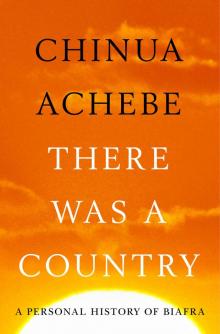 There Was a Country: A Memoir
There Was a Country: A Memoir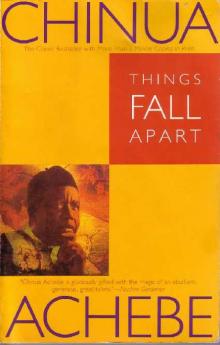 Things Fall Apart
Things Fall Apart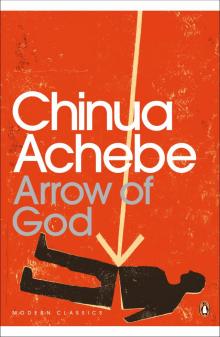 Arrow of God
Arrow of God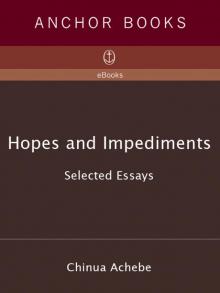 Hopes and Impediments: Selected Essays 1965-87
Hopes and Impediments: Selected Essays 1965-87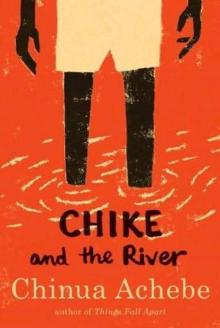 Chike and the River
Chike and the River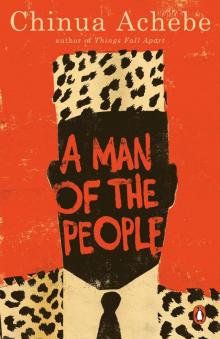 A Man of the People
A Man of the People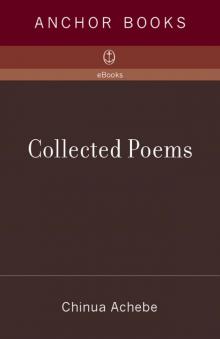 Chinua Achebe: Collected Poems
Chinua Achebe: Collected Poems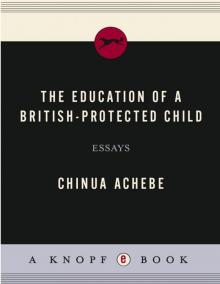 The Education of a British-Protected Child: Essays
The Education of a British-Protected Child: Essays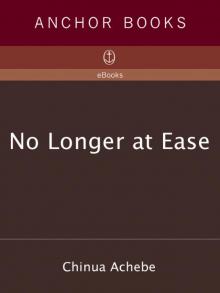 No Longer at Ease
No Longer at Ease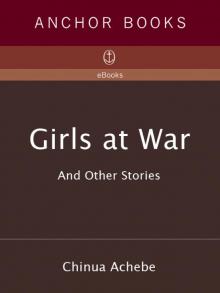 Girls at War
Girls at War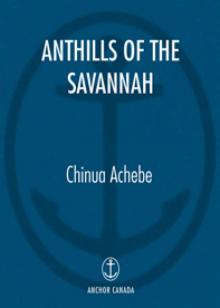 Anthills of the Savannah
Anthills of the Savannah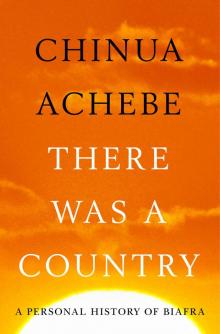 There Was a Country: A Personal History of Biafra
There Was a Country: A Personal History of Biafra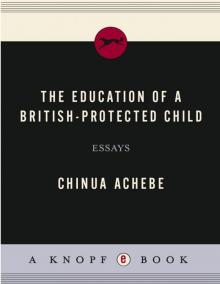 The Education of a British-Protected Child
The Education of a British-Protected Child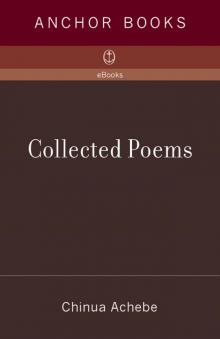 Collected Poems
Collected Poems